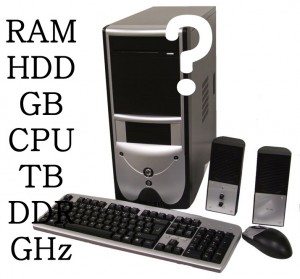New computer?
June 2014
As I mentioned here two months ago, Microsoft ended their support for Windows XP in April, and nothing I’ve written for years has generated so many emails. You can still read it here if you missed it.
Two main issues emerged from all the emails. First, if you are using Windows Vista, you can relax; Microsoft will continue supporting it until April 2017.
 Second, many people asked for advice about buying a new machine. I don’t blame them; it’s a very confusing market and computers are not cheap; laptops start at about £300, desktops at about £350. Some tablets are only £150, but they are rather different animals, although many Oldies find them just the job.
Second, many people asked for advice about buying a new machine. I don’t blame them; it’s a very confusing market and computers are not cheap; laptops start at about £300, desktops at about £350. Some tablets are only £150, but they are rather different animals, although many Oldies find them just the job.
What’s more, if you want an Apple product, you can generally triple those prices. I’m afraid it’s also possible that your elderly printer might not work with a new computer. So, here are a few practical suggestions.
After setting a budget, I suggest that you think carefully about what you really need. If, like most people, you will simply use it for word processing, websites and e-mails but not for resource hogging pursuits like games or video editing, then you don't need a heavy duty model. For just emails and websites, a cheap tablet may be enough.
The issue of memory size is much discussed, but modern computers almost all come with decent memories and unless you are storing hundreds of films or thousands of pictures, most people are unlikely ever to need hard drives of more than 350 GB.
 For most users, it is the physical design which determines how happy they are with it, not what’s inside. The size of the screen (the bigger the better, in my view), the feel of the keyboard, the way the touchpad, touch screen or mouse work, its portability and the position you have to sit in to use it, these are what will irritate you all the time if you get them wrong.
For most users, it is the physical design which determines how happy they are with it, not what’s inside. The size of the screen (the bigger the better, in my view), the feel of the keyboard, the way the touchpad, touch screen or mouse work, its portability and the position you have to sit in to use it, these are what will irritate you all the time if you get them wrong.
The secret is to use any computer well within its capacity, but it is easy to spend too much buying far more than you will ever need. For most home users, my advice is to go to a respectable supplier and buy the cheapest one you can find that is physically to your taste. Most of us would struggle to spot the difference between that and one with the same appearance but much more expensive innards.
Some brief warnings.
Unless you buy an Apple, your new machine will almost certainly use Windows 8; this is very different and takes a bit of getting used to. However, there are free programmes (like Start Menu 8) that successfully make it look much like Windows XP.
 Secondly, I strongly advise buying an extended warranty, from either the manufacturer or elsewhere. In recent years I have had a power supply, motherboard, hard drive and screen fail before two years are up. Each of these can cost up to £200 to repair, sometimes more.
Secondly, I strongly advise buying an extended warranty, from either the manufacturer or elsewhere. In recent years I have had a power supply, motherboard, hard drive and screen fail before two years are up. Each of these can cost up to £200 to repair, sometimes more.
Thirdly, setting up your new computer and transferring your files from the old one can be a little daunting for the novice. Unless you have a relative or friend who can help, using a supplier who offers this service might well be worthwhile. John Lewis and PCWorld certainly do, and no doubt many others.
Finally, remember that you will have to install the software you want; Word, for example, and whatever you use for pictures or music. You may even have to buy new copies, unless you set foot in the world of free, community produced software. Believe it or not, it’s possible to equip your computer with acceptable free software that releases you from bondage to either Microsoft or Apple.
But that’s another story; one I will tackle next time.

